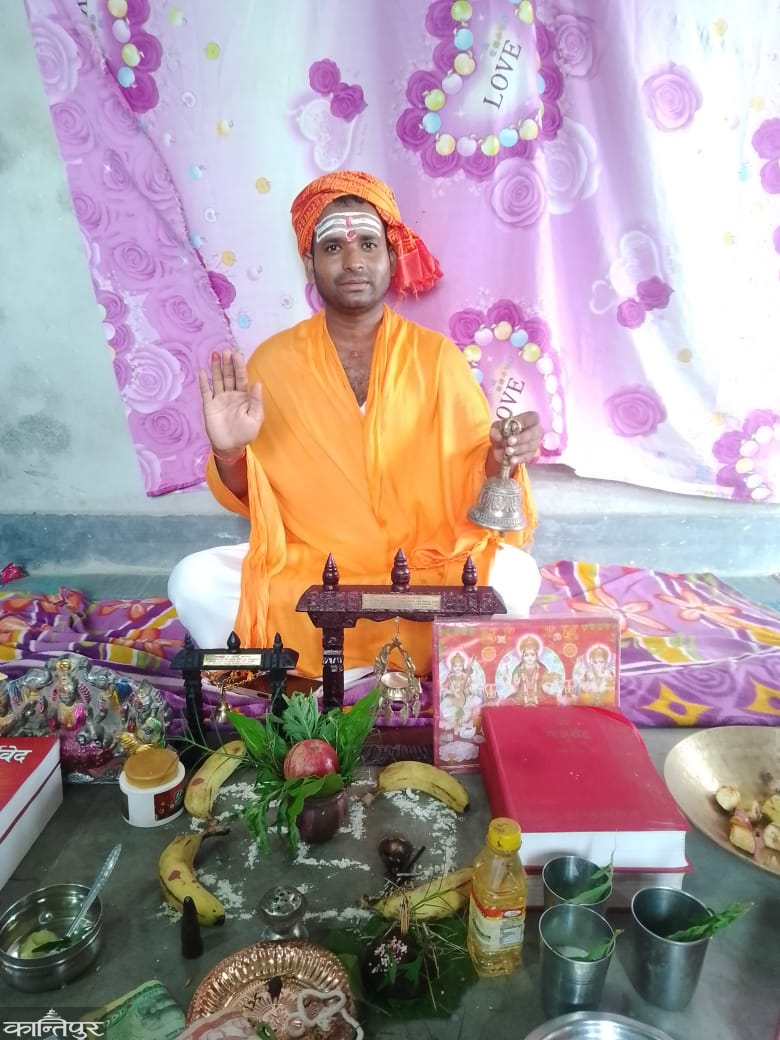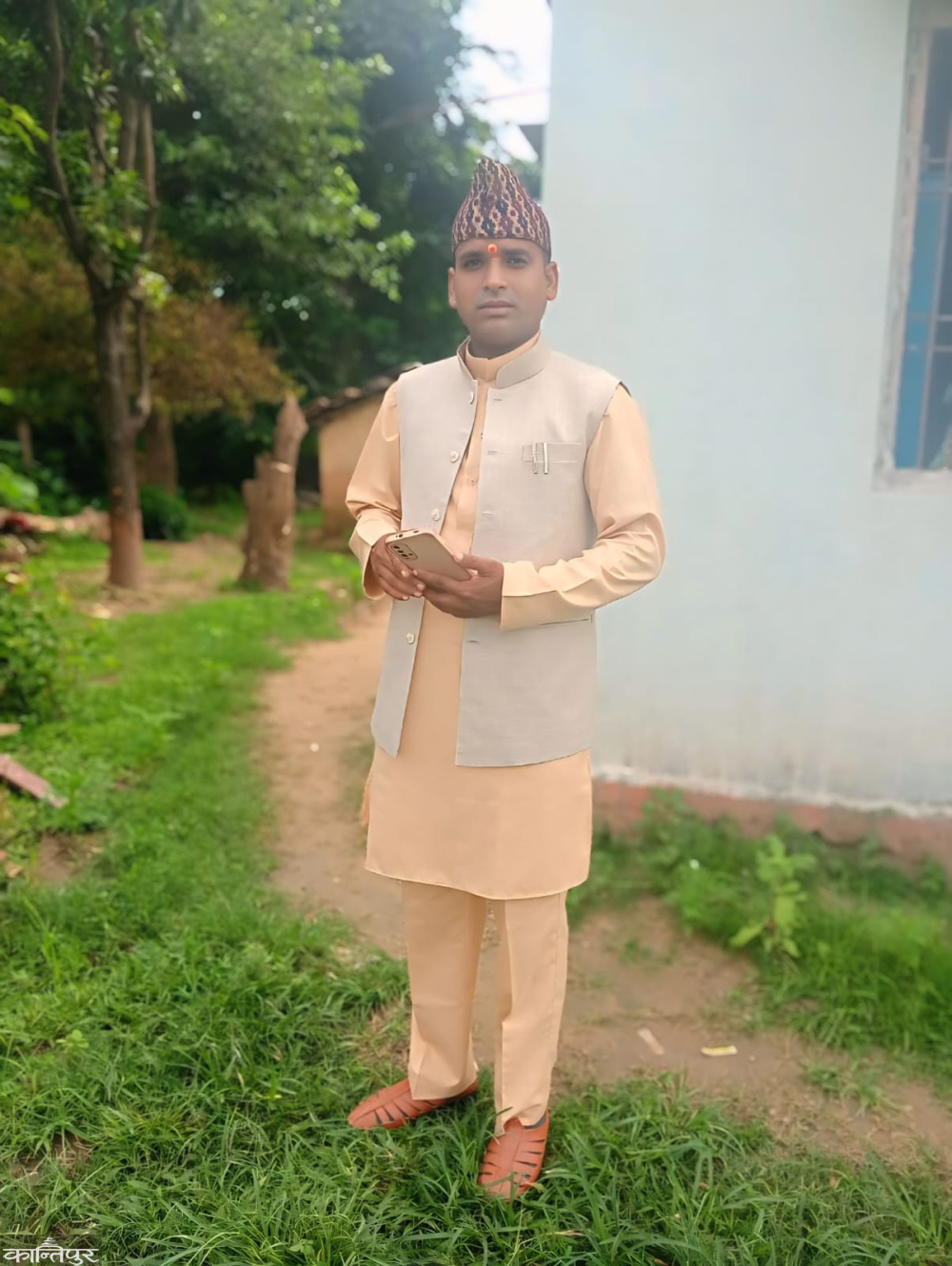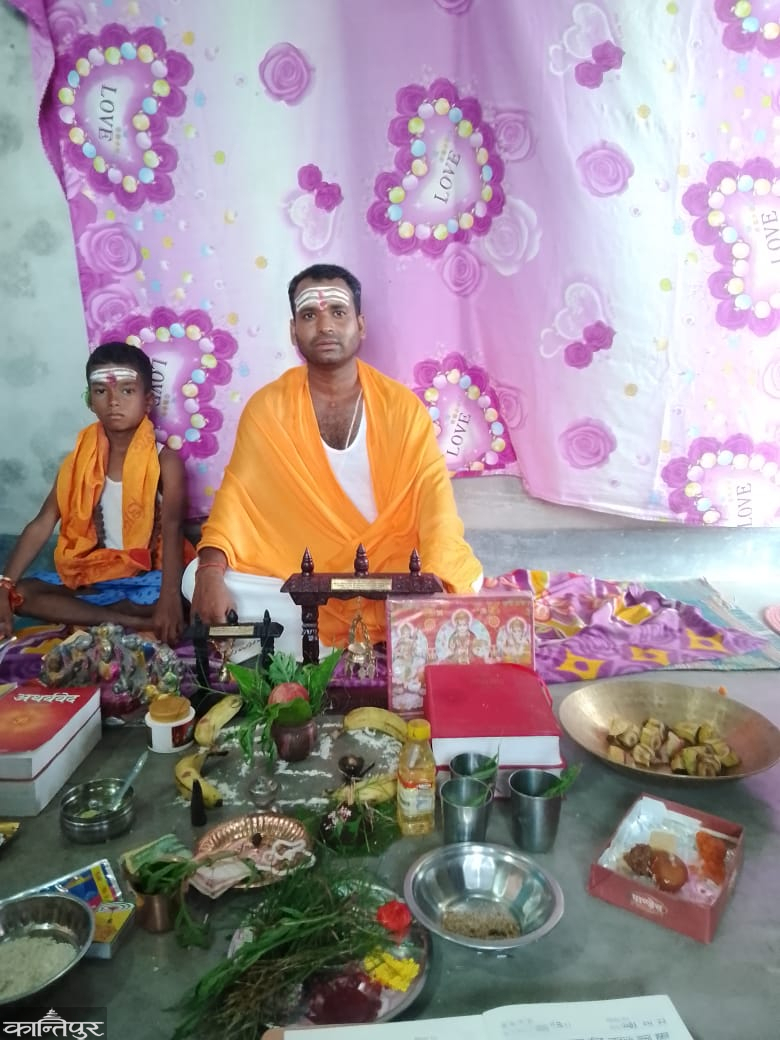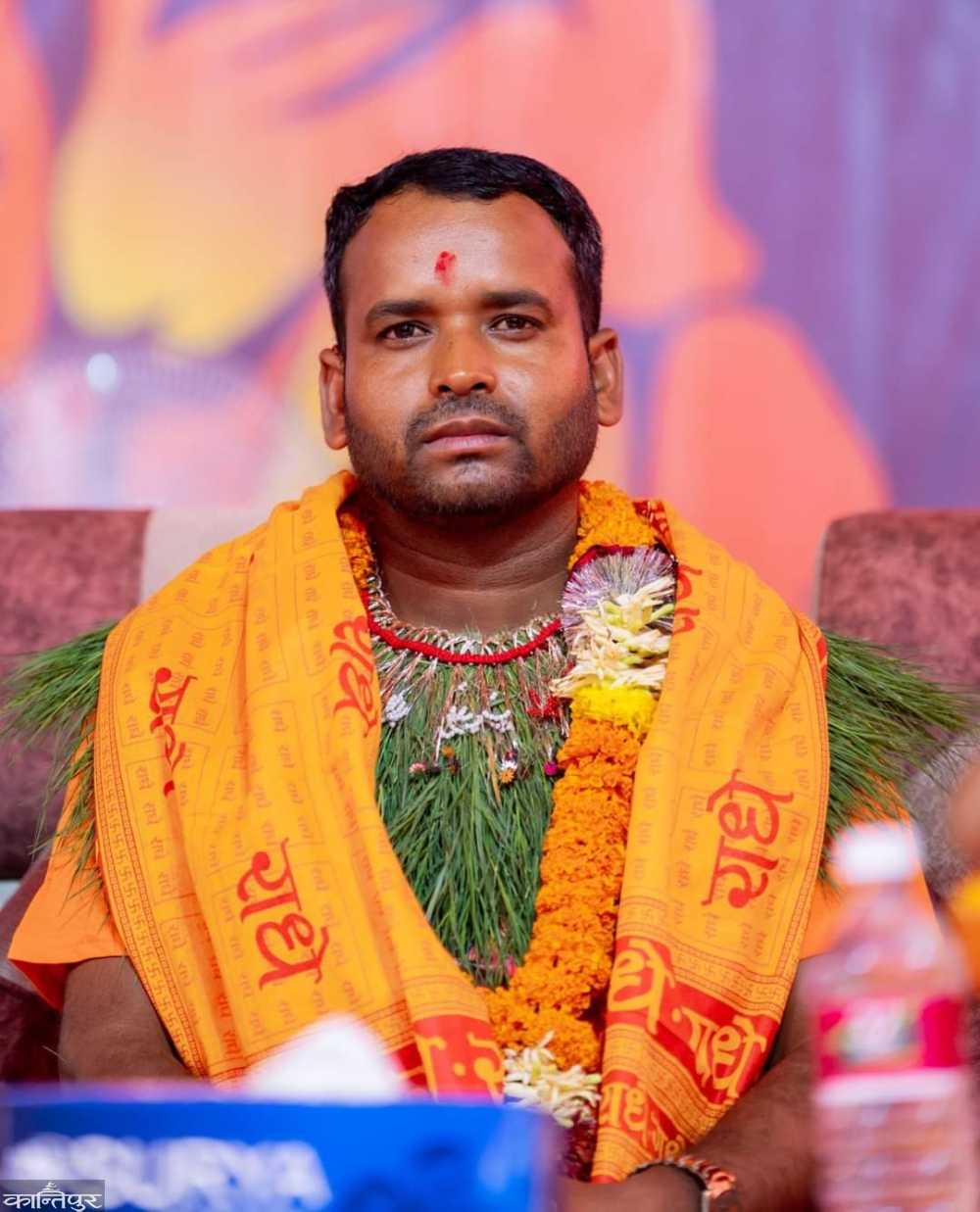Acharya Krishna Damai in Vyasasan

We use Google Cloud Translation Services. Google requires we provide the following disclaimer relating to use of this service:
This service may contain translations powered by Google. Google disclaims all warranties related to the translations, expressed or implied, including any warranties of accuracy, reliability, and any implied warranties of merchantability, fitness for a particular purpose, and noninfringement.

Highlights
- Acharya Krishna Damai of Kanchanpur sat in Vyasasan at the Kotihome of Pashupatinath in Shravana month. However, does this incident contribute to the respect of the Dalit community apart from him or not? What is the purpose of that Vyasana, in which one is doomed to be a so-called 'untouchable'?
- People are discriminating that even when we touch or give a sermon, it is a sin. I created 'Damain Maharaj' to end superstition. The birth of Krishna Maharaj is a happy event – Prakash Saput



Life flower or thorn? One should ask Acharya Krishna this. In the answer, a sentence from one of his Vedic philosophy comes out - a thorn when born, a flower while understanding!

Pandits say, it is a condensed synthesis of the Vedas. Those who say this may criticize Acharya Krishna as 'answers on borrowed words', in which his arguments without experience are always included in the background.
and non-scholars, Marxists or supporters of 'absolute' opinion who have a collective or individual opinion that the pattern of social reform should be like this say - making a Krishna 'Acharya' and making him say a rote phrase that has been corroborated will not eliminate the untouchability of the society, but it will legitimize the ongoing untouchability. poses a risk. Because, even after sitting in Vyasasan, Acharya Krishna continues to be touched by the society. So, if this difference is not erased even by teaching Sanskrit, then what is the point of insulting Vedic scholarship? What is the purpose of Vyasasana, where one is doomed to be an 'untouchable' even if he sits on it? What is the purpose of Vyasasan, in which someone who has been living for thousands of years is saying that 'the world is false, Brahma is true', but he is passing on children after children?
As Acharya Krishna Damai of Kanchanpur sat on Vyasasan in the 'Kotihome' held this year on the Shravan month of Pashupatinath, many such questions gave birth to a heated debate forcing all sections and communities of the society to express their opinions on social media. The Kotihome set up in Pashupati's courtyard became the center of many controversies and debates. Just as Devi Pratibha to Chandrakala Sakhi sat in Vyasasana and forced the advocates of modern jurisprudence of gender equality to comment more than stories, Acharya Krishna, a great figure of the society who has been on the anti-caste campaign, started to stung after sitting in Vyasasana with Marka's comment that 'Look, how liberal religion is'. It had to be intellectually resisted.
After the refugees from Iran came to India calling themselves 'Aryans' and took away the power of the Dravidians from here to rule over them, there is an understanding that the scriptures of those who made a great human beauty untouchable for almost 3500 years cannot give liberation to the Dalits. It is true that the scriptures that call Manu Maharaj and that Manu makes laws to cut people off because there are Shudras in the people, there is no consistency in saying that caste discrimination will be removed by using the same scriptures and the rhythm of the same pundit.
Again, Ekthari's understanding is as follows - 'Because they were not allowed to read the scriptures in the past, they fell behind in knowledge. Being behind in knowledge, he was weak in logic. And, being weak in logic, he was left behind in all aspects of society. And it became easy for the untouchables. The root of it is the deprivation of knowledge, if those who are deprived are made scientists, it will flow well in the society and eventually the concept of untouchability will disappear in practice. Therefore, sitting in Acharya Krishna Vyasasan is absolutely appropriate.'
What does 33-year-old Krishna himself, who is an acharya in Sanskrit literature, a 'scholar' from the Dalit community who holds a master's degree, think about this? We had a long conversation with him to find out.
Krishna from Bhimdatta municipality-3 Vishnu tol of Kanchanpur on the western border of Nepal, who is currently studying astrology after listening carefully to our questions, before answering, he prayed and said softly in an urgent voice - Radhe Radhe!

Born in Bakunna, Shivnath Rural Municipality Ward No. 5 of Baitadi, his father Ran Bahadur Damai and mother Kamaladevi spent their whole lives in touch. Ran Bahadur couple did not think it possible to stay in the ancestral village of Bunna to raise their children, after having learned about the crops after sewing cotton clothes throughout the year. So, she came down to Mahendranagar in search of a fair wage for sewing. The benefit was that Kashna was able to study in Baijnath Mavi near home. Krishna, the second of Baama's 9 children, experienced caste discrimination every day, everywhere, right from his birth. He did not stop studying even in the midst of scorn and social deprivation. "I got through the school education through hardships," Acharya used to say quietly, "But, I didn't have the money to study on it." More than that, he had an indelible wound on himself and his community. Perhaps he wanted to burn it with the fire of knowledge. He wondered what would be the alternative ways to study and move forward even in a situation where there is no money. In the same initiative, his Nepali teacher Ishwar Dutt Bhatt has suggested a solution - read Sanskrit, you can read it for free.
Necessary circumstances determine a person's destiny. This also happened in Krishna's life. Since the family did not have money to provide the education of 'Mooladhar', but the facility of scholarship to study Sanskrit was available, Krishna was able to take the first step on the path of becoming an 'Acharya'. On top of that, he has a great curiosity to know the secrets of Sanskrit literature.
'I wanted to know what the scriptures that created the trap of caste was like,' he said, 'I had nothing to do with it since I could read it without paying.' It has been continued for three thousand years, the story of the accusation that Ram, who is called Maryada Purush, had melted lead in the ears of the Shudras, has been passed down by each generation of casteists to the next generation, and the scriptures chanting the mantra that 'shudras, animals, drums and women are the authorities of chastisement'. It is coming, the curiosity to know what is said in the scriptures made him a very hardworking student in his studies at Sharda Vidyapeeth in Mahendranagar.
While studying Sanskrit in the dormitory, Krishna begins to feel that he is finding the inner light of life.
'Sanskrit is the only way to reach the storehouse of Vedic knowledge and philosophy and one large class has been deprived of this knowledge by another class,' he says, 'this is the big difference, practical touch is limited to the body, the touch of knowledge has hurt the soul. .'
Thus, his Sanskrit studies which started after passing SLC in 2064 continued for 073 years.
Meanwhile, he got married. The poor financial condition of the family forced him to run the family. Calling it a 'game of karma' and an 'account of fate', he left his newly wedded bride and newborn son with a burning heart and activated himself in the 'kitchens' of Mumbai, Dehradun, Rudrapur, etc. in India as needed, sometimes in the process of making sweets and sometimes in the role of sweeping.
'There I used to work all day, I used to study all night so that the knowledge I learned would not be lost,' he remembers the days gone by, 'There are struggles in life during the time of birth and until growing up. break The mental closeness of poets and thinkers of Sanskrit literature, Acharya Bharata, Mammat and Dandi, probably changed his outlook. So the definition of his life has changed. After birth, a person finds himself in the middle of a thorn due to a social situation made up of ugliness, backwardness and poverty. But the accumulation of knowledge and realization can make the flower of happiness bloom even among the thorns, says Acharya Krishna. It has been said at the beginning, his knowledge is not only the conclusion of the Vedas, but also many experiences and realizations of his own life.
After spending almost 7 years working in Anekan city in India, he returned home. Acharya Krishna started working as a hawker in 'Jankranti Dainik' of Mahendranagar. Even though it was not a big amount, the general expenses were raised by that work. He then resumed the teaching of Acharya level of Sanskrit literature which had stopped. While reading, the thought of performing rituals and puretya also came to his mind. When he was trying to start preparations according to the same undertaking, a news about him was published in "Gorkhapatra" on 25th July 2078. The title was – Krishna Damai in the thought of doing rituals.
'The news spread all over the country, people started coming to see me,' he smiles, 'then people contacted me from different places asking me to help them complete their education.' On top of that, the encouragement from all sides encouraged Krishna to move forward. And last year he completed his studies up to Acharya in Sanskrit literature. From that time, those who loved him started calling him 'Acharyaji' and showed respect.
"I was asked why Acharya Krishna Damai didn't come to Kotihome in Pashupati," he says, "Then maybe I was searched, and I was invited there."
After reaching the lecture hall, Acharya Krishna walked towards the stage and sat down in Vyasana, Pashupati Kotihome. When he saluted from the stage in front of the microphone in a Dhaka cap, Rudraksha-mala and a yellow garment, it felt like he was blessing the hungry for knowledge who came to listen to the sermon.

He is such a preacher, who has sat on Pashupati's Vyasana for the first time from the Dalit community and has come with the melody of the heart of the downtrodden. And, has arrived, following Bhagat Sarvajit Vishwakarma's dream of decades ago. He got lost in the emotions of his life-struggle and experience-feelings as he took to the stage amid thunderous applause. Remembered the heavenly parents.
Singer Prakash Saput has an effective song - 'Damain Maharaj' meaning 'Ten Thousand Mahatma Ishwar Maharaj'. The story of the song is as follows - a boy who fled from the village to the city on the charge of entering the temple, after reading Sanskrit literature, becomes the narrator 'Maharaj' and preaches, 'Man! I speak from my heart, listen from my heart! What is your heart, let yourself hum! The mind is fickle, the mind is playful, the mind must be fooled like a child! Otherwise, he will do it! Hal Hal Hal mind! Hall hall hall...Krishna is in my mind, Kansha is in my mind!...'
Acharya Krishna gave a sermon in Kotihome standing next to such feelings and intentions, which was not just a blank thought but also a profound experience of the distant past.
Exactly like in the song, Kotihome was swinging as a preacher - Krishna Bahadur Damai. Let's say, Saput's Manas Katha is being staged from the world of poetry to the real world with the incarnation of Acharya Krishna!
Krishna says, 'Indeed, that song of Prakash came as an inspiration for our class. From the day I heard that song, I thought, I will go to that place and show it by giving a sermon.'
It is as if the adage that a man is what he thinks has become a meaning in his life. While giving a sermon, he remembered the famous song - People are the same, why are they different? In the sermon, he preached to the devotees with the help of Lakshmi Prasad Devkota, '...fly to touch the moon one'. And said - 'I also followed the same path and here I am.'
It was not so difficult for Neil Armstrong to touch the moon in the sky. Because, with enough satellites and physical facilities, after some time of practice, he was easily carried by the spacecraft to the moon. Acharya Krishna was able to live in a pirka named Vyasasana on earth after 3500 years after the beginning of caste untouchability, as a scholar.
Maybe because of this, as soon as he sat there, Krishna Damai's body trembled with joy and excitement, an inexpressible blush of happiness appeared on his face and he began to speak in an emotional tone - Today I am in heaven!
His father Ran Bahadur Damai used to tell him - you should become a good person, become a successful person, remember the great masters of Shilpi (Dalit) community!
As soon as he remembered his father's arti, he was speaking in Bhavatirek, "The lamp of the Dalit community is also lit today. Even Dalits should now read Vedas, Bhagwat.'
He also bowed to the gurus who introduced him to Sanskrit literature. And he said, 'People say that they have to go to heaven, but for me, this is heaven today!'
He wanted to remember this rare moment when he was able to preach among thousands of devotees as a scholar, as the moment when caste discrimination was reduced. Not by anyone's grace and blessing, but by studying Sanskrit literature, he became the first Dalit preacher to live in Vyasasan. Pointing to that, he said, 'The idea that Dalits should also study the Vedas has gained more strength in today's historic Kotihome, I had no idea that I would sit in Vyas and speak at such a holy place.' After giving a sermon on Sanskrit campaign, the Nepali society was shaken. A few questions surfaced. Discussions and articles were written for and against him. His questions were -
1. If he gives such a sermon, will the path of liberation begin in the lives of millions of Dalits in Nepal? Is he aware of that way of salvation? Or is this the right path for Dalit liberation?
2. Do our universities where Sanskrit is taught admit all other Dalits? Are they teaching in Gurukul?

3. Did he really become an 'Acharya' after giving a good sermon at Pashupatinath's Kotihome? Will the society that is discriminating against Dalits be ready to listen to him as Acharya? Is he accepted in all kotihomes, monasteries? Is he considered worthy of such discourse in Shaileshwari in Far West or Tripurasundari in Karnali?
"I have not changed the society by reading Sanskrit, those who laugh after knowing the Bhagwat will not stop laughing," said Acharyaji as if he was giving a sermon while sitting in Vyasasan.
Before going to Pashupati's Kotihome, someone called Acharya Krishna to sit in Vyasasan, nor did he invite him to become a priest to perform any rituals. Even after returning from Pashupati's Vyasasana, no one called him for worship. Nor has the neighbors continued to stop.
'Newly educated boys don't touch, if they do, it will be the backwardness of their life,' says Acharya Krishna, 'Old people with dilapidated bodies who believe the old customs to be true do not know the consequences of touching, because there is nothing to do with them, I ignore such ignorant behavior and walk away. , because it does not create conflict in anyone.'' However, the Dalit community should not be separated from the sap of knowledge and spirituality. However, because of the religion, the life of Dalits has become hellish, or they have to live in discrimination and exclusion, this is being reviewed and accounted for by the Dalit movement.
There is no evil in modern education either. "Reading is more caste," he says, "There is no more time than yesterday to force a person who is educated and able to stand on his own feet to say that this is his caste. Therefore, I ask all Dalit brothers and sisters to read and move forward. The law has made untouchability punishable. If we have advanced awareness, it will disappear by itself.
Law does not stop anyone from studying Sanskrit and the Veda Vidyashrams and Gurukuls encourage any caste to study, he added, 'Now any Dalit teenager can study Sanskrit if he wants to. Also with scholarship. There is no restriction on this.' But, in practice, there are many cases, which are not allowed to read.
Singer Prakash Saput breathed a deep sigh of satisfaction after Acharya Krishna Damai turned the idea of his song 'Damain Maharaj' into reality and sat in Vyasana. Our life is largely influenced by Hinduism. Many people are being discriminated against because they think it is a sin if we touch them or preach them. I created 'Damain Maharaj' to end such superstitions and wrong trends. Krishna Maharaj's birth in this way is a happy event for me,' he says. If there is discrimination even under the guise of religion and faith, there is a need for equality and normalization within it.'
This is a rare incident of a Dalit giving a sermon in Kotihome, but does it contribute to the respect of the Dalit community apart from Krishna Damai or not? Political analyst Vishnu Sapkota feels that although this event is significant, it is a bit complicated to answer the question whether its significance was good or bad. First of all, who made a community of the society 'untouchable'? If a scripture or sect or religion has made someone a Dalit in history, then when the 'Dalit' created by the same community itself is called 'Dalit' and given 'social rights', has the Dalit community been respected?' Isn't this a deliberate act of making another Dalit a 'scriptural Dalit' from the 'untouchable' stigma attached to certain Hindu scriptures?' He says that if there was mass atonement, the act of placing Krishna in Vyasana in Kotihome is 'not enough but good'.
'However, wherever there are aspects of scriptures and rituals that need to be corrected since history, in order to maintain them, a single Dalit is used in his own defense and if the person who is used in such a way does not know that he is being used, then this incident is a further insult to the Dalit community. ' He is confident. According to Vishnu, untouchability is an ideology. "The 'apparatus' or roots of ideology work in a way that is not known, to understand which one has to look at the matter in a subtle way," Vishnu's analysis says, "The incident of Kotihome was certainly good in one respect. As we have discussed now, this is the reason for that incident.'
Bhagat Sarvajit Vishwakarma, who was mentioned above, wanted to see Dalits sitting on Vyasasan during the Rana period. He also built a separate temple for Dalits and offered prayers, that was a kind of religious rebellion. For that, even 10 years before the advent of democracy, organized Dalit liberation movement was launched. At that time, waging jihad against the oppression of the society, caste system and untouchability was really a revolution, which carved a path for the liberation of Dalits. In those days, Dalits were not allowed to wear new clothes, even when walking on the road, they had to walk a few meters away, they had no place in religious activities, they had to enter temples, were not allowed to listen to mantras or knowledge and were not even allowed to eat prasad.
Sarvajit V. no. Founded Vishwa Sarvajan Sangathan in 2003, which was the first organizational organization established for Dalit liberation. In Garagaon of Baglung, V. No. Born in 1950, Sarvajit Vishwakarma's rebellion was a new leap in history. He had the opportunity to study in Benares, and after receiving the title of Acharya in Sanskrit, he was called a Bhagavata recipient before his name. And his name remained – Bhagat Sarvajit. He read Vedas, Upanishads, Puranas, Manusmriti etc. He was the first Dalit leader who not only argued that there is no superiority in religious texts, that no one can be insulted on the basis of religion, but also a kind of religious rebellion. At that time, he wrote a song - 'Is there any lacquer in the bazaar, do you know the price of curd?' . Against such exploitation, he launched a campaign to break Aran's neck. It was a great struggle against economic exploitation at that time. The so-called Upalla caste leaders of the village blamed the Rana. He was jailed and severely tortured on charges of sedition and breaking the law.
vs. In 2010, under the leadership of Siddhi Bahadur Khadgi, the Social Reform Association organized the 'Pashupati Temple Entry' movement. This was also an important achievement of the Dalit movement. It was written in the temple - 'No entry for untouchables'. Seven hundred and fifty people were arrested after the protest broke out. History says - In 2013, the activist of the Indian Dalit movement Dr. When Bhimrao Amvedkar came to Nepal, he was called 'Sarki' and was not allowed to enter Pashupatinath. Now Krishna Damai gave a sermon in the same Pashupati campus.
The information about this caste violence against Sarvajit seems to be in the subconscious mind of Dalit community even today, after Krishna Maharaj returned from Kathmandu after giving a sermon, his wife Jyoti became scared.
"She was very worried that there would be violence against us," Acharya Krishna laughed and tried to dispel his wife's fear, "I had to remind her a lot not to be afraid of anything."

 प्रकाशित : भाद्र २२, २०८१ ०९:२५
प्रकाशित : भाद्र २२, २०८१ ०९:२५

 २२.१२°C काठमाडौं
२२.१२°C काठमाडौं














